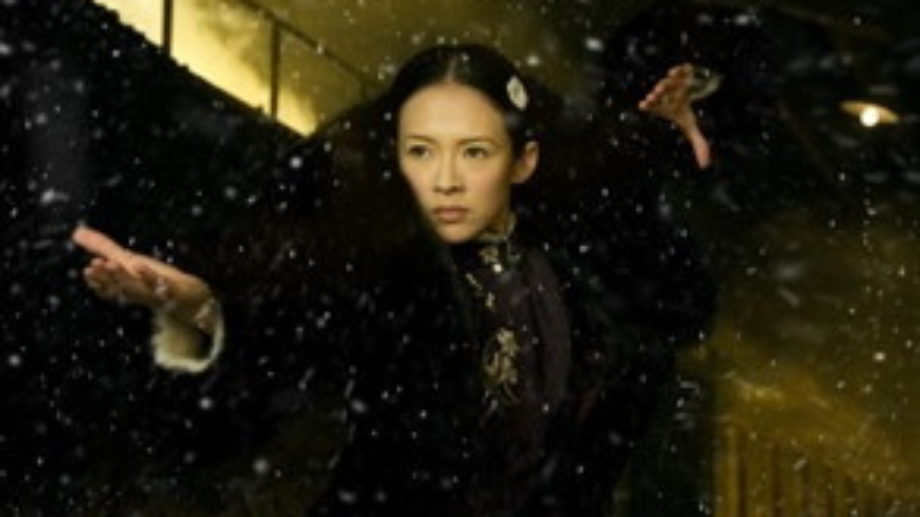
Tony Leung, Wong Kar-wai and Zhang Ziyi at a Berlinale press conference. Photo: Brian Brooks
Perhaps at first take an unlikely pairing, Hong Kong auteur Wong Kar-Wai is set to open the 63rd Berlin International Film Festival in a matter of hours with his anticipated kung fu feature The Grandmaster. Wong is already a large presence at this year’s Berlinale, serving as president of the festival’s main competition jury. His latest film, which reunites him with actor Tony Leung and actress Zhang Ziyi, is a work that was six year’s in planning and made over three years.
But The Grandmaster‘s earliest roots came in 1996 when Wong was in Argentina filming Happy Together, which went on to screen at the New York Film Festival in 1997. During the shoot, he walked by a newspaper kiosk and noticed a magazine cover with Bruce Lee splashed across it. It made a strong impression on Wong that, two decades after Lee’s death, the big screen martial artist was still a global icon. He initially wanted to tell the story of one kung fu master on one street, but he quickly realized the story would embody a tumultuous period in 20th century Chinese history.
“I hope that this film will bring more [to the screen] than kung fu. It is also about the ‘grand master’ and the Chinese,” Wong said in Berlin Thursday afternoon, following a pre-World Premiere press screening. “Someone can be a good fighter, but not a grand master. A grand master has the skill and the ability to pass along his skill to future generations. I believe The Grandmaster is more than a kung fu film.”
In the true story, Leung plays Ip Man, the legendary teacher of Bruce Lee and a master of the Wing Chun school of kung fu. Ip Man is born to a well-off family in Foshan in the south of China. Never in need of money throughout his youth, he spends his time pursuing his passion for kung fu. Typifying his status, his wife Zhang Yongcheng (Sony Hye Kyo) is a descendant of Manchu nobility. He is often seen in the company of Foshan’s kung fu masters at the Gold Pavilion, an elegant brothel that serves as a meeting place for the elite martial artists.

But turbulence is in the air as Japan invades China’s northeastern provinces in 1936. Grand master Gong Baosen (Wang Qingxiang) arrives in Foshan after leaving his occupied home in the north. Also arriving is his daughter Gong Er (Zhang Ziyi), who is the sole inheritor of her father’s lethal Bagua-style “64 Hangs” technique. It is here, during her aging father’s retirement ceremony at the Gold Pavilion, that she first encounters Ip Man. Their encounters set the backdrop for a larger historical context. The two meet again in Hong Kong in the 1950s where the British colony is a new world with people who have fled the rise of the communists on the mainland and the collapse of the Chinese republic. But old alliances and rivalries continue to exist. Ip Man lost his family wealth after the Japanese invaded Foshan, but he turns to his beloved kung fu and opens a school in the city. He soon acquires a cadre of disciples, including Bruce Lee.
“The biggest challenge for me in making this film is that I don’t practice martial arts,” noted Wong Thursday. “I was amazed by this world. We tend to think of martial artists as doing things by force. But during this journey, I was impressed by their modesty.”
Leung’s journey as grand master Ip Man also meant several years of learning kung fu, which posed more than just a physical challenge for the mid-40s actor. “After four years of studying martial arts [for this role], I learned that it’s not just physical. There is a spiritual side of kung fu you can’t simply learn by facts. You can only achieve that through practice. I started to learn kung fu at 46.”
The film dazzles with beautiful shots reminiscent of Wong Kar-Wai’s past films, though the sumptuous shots are a means of displaying the complex rhythms and artistry of kung fu. Journalists this afternoon seemed to gush before Wong and his actors, though one said he thought the film sometimes looked “too good.”
Wong, for his part, believes The Grandmaster offers a universality that will translate for audiences globally. “It’s about values and I think an international audience can relate to that.”
Watch a trailer for Wong Kar-Wai’s The Grandmaster with English subtitles courtesy of Film Comment:



